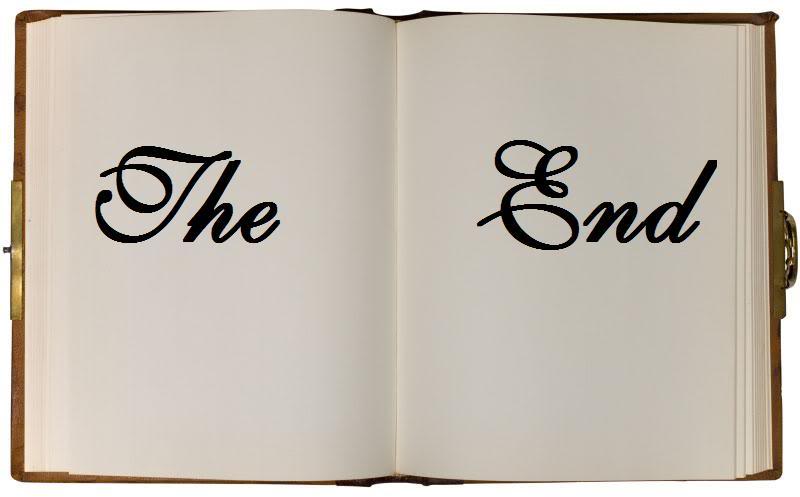I hate ending, typing the last word. Whether it’s the end of a book or the end of a character. They’re painful to imagine and worse to write.
You can tell when a story has reached the end, events all move to bring your main characters together at the same point. Usually, there is nothing left of the plot at this time, except for the explanation of it all, the justification for what has happened or the big reveal, where one side tells the other what has gone on and motives are all brought out. Hopefully, by this time you (the reader) have got an idea of what’s going to happen; so you are either pleased to have got it right, or pleased to have been misled and amazed that you missed the clues, the re-telling of which very often form part of the final scenes.
Hopefully, by this time you (the reader) have got an idea of what’s going to happen; so you are either pleased to have got it right, or pleased to have been misled and amazed that you missed the clues, the re-telling of which very often form part of the final scenes.
As the author, I can generally tell when it’s time to finish. In my experience, there is a natural ending in my mind and once I get there, even if I can think of more, it would often be better put into a sequel.
However, if you’re not careful, the end can be the worst part of the story. Recently I’ve had two different reactions to the end of my work.
One book seems to have ended too soon for a lot of readers, and so I’ve written a sequel. The intention wasn’t to short-change them, I really thought the ending was appropriate. It’s gratifying to get feedback like that; I take it to mean that I’d managed to create characters real enough that people wanted to know more about them and to care about their futures enough to want to find out what I think happened next. At first, I wondered if I should have written more, then I decided that, by stopping when I did, I had done enough.
The other book has ended in an anti-climactic way for some, although not all, readers. Apparently, I upped the tension more than the ending could take and it was all a bit flat. That is my failing and I have to hold my hands up, but in my defence, that’s how it unfolded in my head. Again, that wasn’t a universal response; other people said the ending was good.
But isn’t life like that sometimes? The culmination of an adventure or a project can be a bit of a letdown, for so many reasons. Anticipation can ruin any event. In a way, I guess, writing imitates life, the end is not always perfect, sometimes the good guys don’t win. Sad but true!
I guess that just goes to prove that every review is subjective, everyone has things that they like and dislike. I have reviews that alternately praise and criticise the same thing in a story, and it can be illuminating to discover the elements of a narrative that readers are drawn to – such as minor characters that attract attention or little bits of subplot that just seem to grab someone’s attention.
And that’s where part two comes in, the death of a character! 🙁
For me, killing a character is the hardest things that I do, and even when the plot demands a sacrifice I still find it difficult. After all, I’ve brought them to life, given them every attribute of independence, thoughts, words and free will, or at least the appearance of it. And very often, they will write themselves little extra’s, ideas that pop into my head to give them more life and realism as their part in the tale progresses.
And yet, in the back of my mind is the knowledge that they must expire. Like the one in red in Star Trek, some are doomed from the start. And their demise is often necessary to move the plot along; after all, you can’t have a murderer without victims. I suppose that they can be killed off before the story starts but where’s the logic in doing that every time? And where’s the fun of writing it? Because for every doomed character, there’s another one who’s fate is to be the killer, and they can be just as difficult to manage. But that’s another post.
There are some characters that have been created for that very purpose, who grow on me. I catch myself wondering if they really have to go; if perhaps I couldn’t… just this once… but it never works.
And believe me; I’ve tried other ways to keep them alive. I’ve tried banishing them by making them ride off into the sunset or by injuring them so they take no further part in events. Yet they sit there in the back of my mind, knocking on the door of my creativity demanding another go. And I’ve even offered some of them a short story all of their own, just to get a bit of peace.
And when it’s all over, and the last sight has faded from their eyes, I feel the remorse, almost as if I had done the deed myself. Maybe in a way, I’m just as guilty as my other creation, the murderous character who I get to do the deed.
In which case, I’ll need you to take several other offences into consideration.
What about you? How do you like to see a book finish, do you want to be left wanting a sequel or would you rather it was all wrapped up? And how about the characters that didn’t make it, do you want to see them again? Do you wish they were still alive or want to know their back stories?
Do let me know in the comments box below.
![]()




David Tubby
I hate, more than words can easily express, the sort of cliffhanger ending where none or most of the plot threads are left untied so that the reader is almost compelled to buy and read the sequel. My hatred is sufficient that, in most cases I am able to resist the temptation to buy the sequel. I really want all the plot threads to be neatly tied up and resolved. I don’t insist that the villain (or the hero) should be killed, as long as he gets his comeuppance. I am aware that, were this real life, characters would continue to do things, have adventures and maybe change – there is a reason why children’s stories used to end “and they all lived happily ever after”. I would be equally content if they ended “and they all lived unhappily ever after”. I don’t mind if room is left for a sequel, after all even authors have to eat sometimes, as long as my arm is not twisted too heavily to buy it. One book I read recently tied up all the loose ends in the last few pages but introduced a totally new character and problem in the last page, which I thought was quite clever and which did not activate my cliffhanger-phobia.
The question you ask about characters that didn’t make it is almost unanswerable. It depends on the character and probably more on the author. Is there more to say about the character. Did they have an interesting life before they had the misfortune to stray into your book and get killed off? The spear-carrier whose head gets chopped off by the hero as he escapes from the dungeon may have had a more exciting life than the hero, or his brief encounter with the hero may have been the most exciting thing ever to happen to him. That is for you to tell me.
And finally, I am pleased to make the acquaintance of someone else whose fingers are determined that “the” is spelt “teh” regardless what the brain might think.
Richard Dee
Indeed. My fingers work far too quickly and the spell check cannot keep up. However, my wonderful editor spots them all in the finished product.